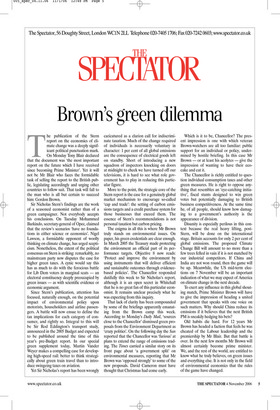Brown’s green dilemma
The publication of the Stern report on the economics of climate change was a deeply significant political punctuation mark. On Monday Tony Blair declared that the document was ‘the most important report on the future which I have received since becoming Prime Minister’. Yet it will not be Mr Blair who faces the formidable task of selling the report to the British public, legislating accordingly and urging other countries to follow suit. That task will fall to the man who is all but certain to succeed him: Gordon Brown.
Sir Nicholas Stern’s findings are the work of a seasoned economist rather than of a green campaigner. Not everybody accepts his conclusions. On Tuesday Mohammed Barkindo, secretary-general of Opec, claimed that the review’s scenarios ‘have no foundations in either science or economics’. Nigel Lawson, a formidable opponent of woolly thinking on climate change, has urged scepticism. Nonetheless, the extent of the political consensus on Stern is striking: remarkably, no mainstream party now disputes the case for higher green taxes. A cynic would say this has as much to do with the ferocious battle for Lib Dem voters in marginal seats — an electoral constituency deeply preoccupied by green issues — as with scientific evidence or economic argument.
Since Stern’s publication, attention has focused, naturally enough, on the potential impact of environmental policy upon motorists, householders and airline passengers. A battle will now ensue to define the tax implications for each category of consumer, and rightly so. Integral to this will be Sir Rod Eddington’s transport study, announced in the 2005 Budget and expected to be published around the time of this year’s pre-Budget report. In our special green supplement today, Martin Vander Weyer makes a compelling case for developing high-speed rail: better to think strategically about green train travel than to introduce swingeing taxes on aviation.
Yet Sir Nicholas’s report has been wrongly caricatured as a clarion call for indiscriminate taxation. Much of the change required of individuals is necessarily voluntary in character: 1 per cent of all global emissions are the consequence of electrical goods left on standby. Short of introducing a new squadron of inspectors knocking on doors at midnight to check we have turned off our televisions, it is hard to see what role government has to play in reducing this particular figure.
More to the point, the strategic core of the Stern report is the case for a genuinely global market mechanism to encourage so-called ‘cap and trade’: the setting of carbon emissions targets and a credit purchase system for those businesses that exceed them. The essence of Stern’s recommendations is not personal taxation but carbon pricing.
The enigma in all this is where Mr Brown truly stands on environmental issues. On paper, his green credentials are clear enough. In March 2005 the Treasury made protecting the environment an official part of its performance targets. Objective 8 now reads: ‘Protect and improve the environment by using instruments that will deliver efficient and sustainable outcomes through evidencebased policies’. The Chancellor responded dutifully this week to Sir Nicholas’s report, although it is an open secret in Whitehall that he is no great fan of this particular economist. It remains unclear precisely what he was expecting from this inquiry.
That lack of clarity has been compounded by some of the briefings apparently emanating from the Brown camp this week. According to Monday’s Daily Mail, ‘sources close to the Chancellor’ dismissed green proposals from the Environment Department as ‘crazy politics’. On the following day the Sun reported that the Chancellor was ‘furious’ at plans to extend the range of emissions trading. The Times carried a similar story on its front page about ‘a government split’ on environmental measures, reporting that Mr Brown was ‘opposed strongly’ to some of the new proposals. David Cameron must have thought that Christmas had come early. Which is it to be, Chancellor? The present impression is one with which veteran Brown-watchers are all too familiar: public support for an individual or policy, undermined by hostile briefing. In this case Mr Brown — or at least his acolytes — give the impression of wanting to have their ecocake and eat it.
The Chancellor is richly entitled to question individual consumption taxes and other green measures. He is right to oppose anything that resembles an ‘eye-catching initiative’, fiscal stunts designed to win green votes but potentially damaging to British business competitiveness. At the same time he, of all people, should know how damaging to a government’s authority is the appearance of division.
Disunity is especially perilous in this context because the real heavy lifting, postStern, will be done on the international stage. Britain accounts for only 2 per cent of global emissions. The proposed Climate Change Bill will amount to no more than a few trees felled in vain if it is not matched by our industrial competitors. If China and India are not won round, then the game will be up. Meanwhile, the US mid-term elections on 7 November will be an important indication of what we may expect of America on climate change in the next decade.
To exert any influence in this global shouting match, Prime Minister Brown will have to give the impression of heading a united government that speaks with one voice on such matters. Why should China reduce its emissions if it believes that the next British PM is sneakily hedging his bets?
Old habits die hard. For 12 years Mr Brown has headed a faction that feels he was cheated of the Labour leadership and the premiership by Mr Blair. But that battle is over. In the next few months Mr Brown will almost certainly become prime minister. We, and the rest of the world, are entitled to know what he truly believes, on green issues and everything else. It is not only in the field of environmental economics that the rules of the game have changed.


















































































































 Previous page
Previous page